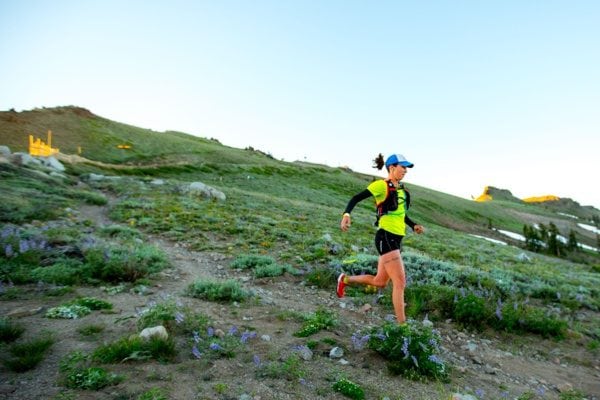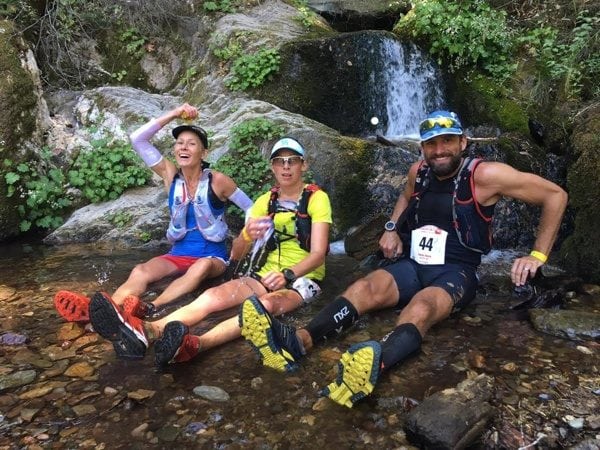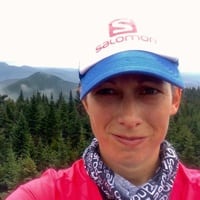I was having one of those effortless days as I floated up past the cheering spectators on the dimly light road climbing out of Squaw Valley, California. Glancing to my left, and then to my right, I gauged my effort in comparison to those around me. Despite only being a few miles into the Western States 100, I felt I was in great shape and great position to be a contender for the podium. I felt a small grin raising the right corner of my mouth and thought to myself, “Today could be my day.”
In this moment of euphoria my eyes unmethodically fluttered open and adjusted to the darkness, as I gently rolled out of bed so to not wake my husband. Walking out of the room while closing the bedroom door behind me I had the realization that what I described above was a dream. In just a few short hours I would begin the journey of writing my 2016 Western States story. I was hopeful that the confidence and emotions that I felt during my vivid dream, those very feelings that I so often chase, would unfold into reality.
Before I could over think things any further George emerged into the kitchen and walked me over to get my bib. I didn’t speak of my dream; instead my focus remained on the details of my final preparation. When the countdown ticked below three minutes I weaved my way closer to the glowing red lights of start clock. I merged and navigated until I found myself surrounded by those in my dream. I took a moment and wished them luck before we were off to see what the journey held for each of us.
The first half of a mile felt like déjà vu. The effervescent spectators on point, the flashes on iPhones precisely timed, and the cowbells clanged on cue. When the noise and adrenaline of the crowed diminished I was left with the sound of my footfall and a wheezing sound from my chest. I slowed my pace, as the others from my dream ran ahead, literally leaving me in their dust. Sometimes I find myself angry that I have exercise- and allergy-induced asthma, but it is one of those things that is beyond my control, all I can do is try to manage it. I decided to use my inhaler and I convinced myself that once I was over the high point and headed down the backside I would feel better. I felt like I was taking quarter breaths as I worked my way up past the terminus of the tram and then up the steepest approach of the Escarpment. As I reached the top I turned back to see the sun rising over Lake Tahoe and hope that the next section would be a fresh start.

Aliza descending in the high country. Photo: Drymax/Bob MacGillivray
Over the next miles I continually ran a smart pace, only running as fast as my breathing would allow. I kept telling myself that my breathing would only get easier as the section immediately in front of me dropped in altitude and is typically less dusty. I continually checked my watch to see my progress in altitude loss, but it seemed for a while that after every descent there was a climb that would eliminate that progress. I could still hear the high-pitched wheeze, an adventitious lung sound caused by narrowed airway. It was causing me angst, so I turned on my iPod hoping to not further evoke my breathing issue with an anxiety attack.
Unexpectedly my attention was shifted from the beat of my music to the feeling of needing to make a dash to the bathroom, literally holly crap. I dusted that little emergency dash off as a one and done. I kept my fueling on schedule and continued plugging away waiting for my body to align with my mind. A few more unforeseen pit spots made me start to consider reality, but, surprisingly, I kept my mind positive and focused on what I could do to try and remedy the situations. Some difficulty breathing and an upset stomach were not going to stop me after all I had done to prepare for the race.
As the temperature rose I took the precautions I thought necessary to keep my body cool. At Last Chance I filled up my hydration pack before the long climb up to Devil’s Thumb and, then, got wet in the stream before beginning my hike up. Midway up in the heat I decided it was time to take a salt capsule and reached into my back pocket only to realize my little baggie had filled with water when I sat in the creek. Now without a sodium source, I focused on not over drinking. Arriving at the aid station I had three things to remember: water, salt tabs, and a popsicle. To my surprise there was just table salt, so I filled my hydration bladder, ate a potato dipped in salt, and ran off with my popsicle. In typical fashion a piece of my popsicle broke off and gravity took over. I looked down to see if it landed on my shoe, but there was a problem, as I couldn’t see my shoes because my stomach was so bloated. I ditched my popsicle and decided not to put more calories into my stomach until I could get the electrolyte balance under control. I racked my brain to see in my symptoms crossed matched with those of hyponatremia.

Cooling off in the stream below Devil’s Thumb. Photo: Lets Wander Photography/Jesse Ellis
Focus was taken away from my bowling-ball belly when I suddenly had to dash for a bathroom break again. Instead of the relief I was hoping it would bring to my stomach the pain just intensified making it feel like a over inflated balloon on the verge of exploding. I knew in my mind there was still time, my day could still turn around, I just needed to better manage things. This hope slipped away as my run turned into a walk and my walk turned into a shuffle. Finally with more eyes on me I ran the final tenth of a mile into Michigan Bluff and in total frustration I told George I was done. My body was fighting me every step of the way and there were a lot of steps behind me and still a lot that remained ahead. “Give it time” was the advice that I was given from countless persons. I opted to evaluate my physical status tucked hidden away from plain sight with George by my side.
As we talked I began crying and told him “I tried, I really did try.” After roughly an hour and a half I walked to the far end of the aid station and sat once again. Even walking made my stomach hurt so I had no intent of donning my hydration pack and continuing on. Feeling the way I did it felt unsafe for me to be alone. When one of my Salomon teammates came through she wanted support in getting to Foresthill and I agreed to walk with her with the intent of dropping at the next aid station.
I wanted to help her accomplish her dream of finishing her first 100-mile race, so we walked and we ran and we made it to Foresthill. Then something wonky happened as I ran into the aid station, I started dancing and joking around. I grabbed my pacer and we were off. My mother seemed speechless, but managed to blurt out, “Get in the car!” In retrospect, mothers know best, as my run soon turned into a walk and my walk soon turned into me hunched over on the side of the trail repeatedly throwing up. Even with the smallest sip of water I would throw up, even with nothing I would throw up. It got to the point where I was throwing up so repetitively that tears started flooding my eyes without warning. Now, I was done! No more games, no more believing that things would get better, no more giving it a few more miles, my body had spoken all day and now it was time to listen.
After walking to the Near Side aid station of the Rucky Chucky river crossing, I asked what my options were and declared, “I AM DONE!” With my pacer Cassie by my side we had two options, we could take a shuttle out and get picked up at Driver Flats or cross the river and meet my crew on the other side and walk out to Green Gate. Without hesitation I blurted out “I’m not going in that water, I’m not.” George was ferried over in the raft to discuss me dropping and the options on getting out. We all agreed that it was not in my best interest to get wet and, then, struggle to keep warm while crawling the miles back to the car. With no hesitation or regret I allowed Bruce, the aid-station captain, to cut off my yellow bracelet. With the remnants of my race in his hands I thanked him.
With the sounds of the river looming down below I sat shivering wrapped up in a blanket left with two dichotomous questions. The first being, why did it take me so long to drop? And the second question being, why did I drop? I wanted to badly for it to be my day, to show what I was capable of. When I realized I was not going to be competitive perhaps my desire transformed to wanting the validation and recognition for toughing it out. So why drop after grinning and bearing it for 78 miles? It came down to the damage I was doing to my body. Without being able to hydrate or consume calories for many of the miles I had already tackled I was risking my health.
Previously, just the thought of the acronym DNF made me cringe. This DNF though feels different, as I know that I fought from the start to where my day ended. It took more courage for me to say that my mind and body are more valuable than saying I finished, and with this I accept the DNF that is affixed to my 2016 Western States result.
Call for Comments (from Bryon)
- Have you run races where you did all you could to resolve issues, but not had success?
- When have you known, without question, that it was time to DNF and that you’d be ok with it afterward?
